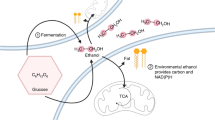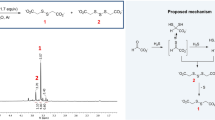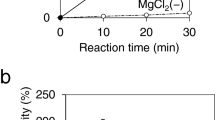Abstract
STUDIES of the oxidation of glucose-6-phosphate and 6-phosphogluconate by extracts of many types of cells have indicated the existence of an oxidative pathway leading through pentose phosphate to triose phosphate, in addition to the anaerobic steps of the Embden–Meyerhof scheme. We have recently obtained an indication of the potential importance of the oxidative pathway in the economy of the cell from a study of gluconate utilization in Escherichia coli, strain B.
This is a preview of subscription content, access via your institution
Access options
Subscribe to this journal
Receive 51 print issues and online access
$199.00 per year
only $3.90 per issue
Buy this article
- Purchase on Springer Link
- Instant access to full article PDF
Prices may be subject to local taxes which are calculated during checkout
Similar content being viewed by others
References
Cohen, S. S., J. Biol. Chem., 177, 607 (1949).
Berger, L., Slein, M. W., Colowick, S. P., and Cori, C. F., J. Gen. Physiol., 29, 379 (1946).
Author information
Authors and Affiliations
Rights and permissions
About this article
Cite this article
COHEN, S., McNAIR SCOTT, D. Gluconokinase and the Oxidative Path for Glucose-6-Phosphate Utilization. Nature 166, 781–782 (1950). https://doi.org/10.1038/166781b0
Issue Date:
DOI: https://doi.org/10.1038/166781b0
This article is cited by
-
Studies on gluconate metabolism in Aspergillus niger
Archiv f�r Mikrobiologie (1969)
-
Direct Oxidation of Glucose by Aerobacter sp.
Nature (1951)
-
Utilization of Gluconate and Glucose in Growing and Virus-infected Escherichia coli
Nature (1951)
Comments
By submitting a comment you agree to abide by our Terms and Community Guidelines. If you find something abusive or that does not comply with our terms or guidelines please flag it as inappropriate.



